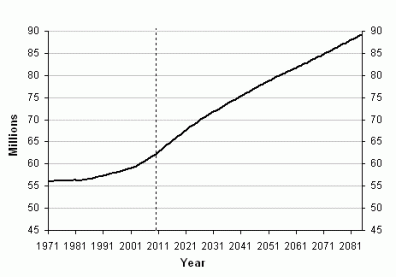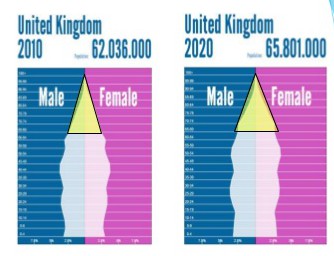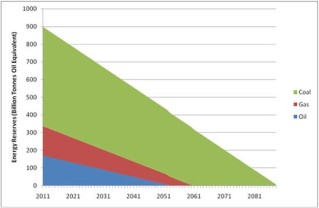What does the NHS face in the upcoming years with a growing population?
The 21st Century is often called the ‘Age of Technology’; we’ve made huge technological advances which have opened up many gateways, especially in medicine. The modern world has helped define the barriers of medicine as well as develop our scientific knowledge of the body and the world around us. Nevertheless, the future is uncertain, and just as we face issues now with our healthcare system, there are more issues to come.

Expected Population Increase (2011)
One of the most predictable issues that medicine will face in the next fifty years is the lack of hospital beds and GPs, both in the UK and worldwide. Currently, only 3.6%[8] of patients take up hospital beds. The news has constantly picked up that the NHS simply does not have enough funding money[9]. With an ever-growing population of an average of 0.6% in the UK[1], whether it is due to immigration, or an increased life expectancy and birth rate[12], it’s extremely difficult to find the resources to supply the increasing demands of people who require medical attention, as well as balance the funding, especially with the recent recession. Thus, we find ourselves in a situation where we have more sick people than available healthcare and this issue will continue to increase. This is mainly due to the surplus population, but also due to the lack of doctors in the area. The ratio of doctors to patient on average in the UK is about 3:1000[2&3&4] which is very unsafe; it puts unhealthy pressure on the GP to meet the requirements of these people.

An Increasing Population and a change in the makeup of the population (in terms of age)
In these graphs the population is divided into an age pyramid. Only a small percentage of elderly population make up the total population compared other age groups. However, recently, this has begun to change; a talk at UCL introduced me to this recent concept of an increased life expectancy due to advancements in medicine. This has changed the shape of the pyramid and we now see an increasing number of elderly people; for example, the two graphs show us that on average, there has been a 0.6% increase of 65-69 year over the past ten years[6&7]. Should this rate of growth remain constant, we can expect up to a 3% increase within 50 years, which adds to the population growth. As we have more elderly people, it’s more likely that hospitals will have to deal with more conditions related to age-related diseases such as Alzheimer’s disease; this again will put pressure on hospital beds as recent research had found that the elderly are given more priority in hospitals, thus limiting the number of beds for other patients suffering from equally or more severe diseases.
The increase has also caused many more problems for the new generation. As we become more dependent on technology, we begin to lose out on daily activities that keep us active and healthy. The number of children that spend their time in front of a screen is staggering and these children are not getting the levels of exercise they need; it may also have adverse mental effects. Furthermore, there’s now an increased amount of advertising, especially for unhealthy food, leading to an increased risk of obesity. Humans biologically were not meant for a sedentary lifestyle, and hence it has adverse effects on our health. With the number of health-related issues rising, such as diabetes, heart disease and obesity, the NHS will be put under strain to deal with a lot more patients, especially in the next fifty years as technology’s impact on human civilisation increases; who knows, technology could make life so easy, no one would have to get out of bed to do anything at all. The energy we consume would be more than the energy we output, leading to the storage of fats. These could cause blockages in the artery, as well as other problems in our body, perhaps resulting in more severe health problems.
This leads to the idea that there are more diseases to come; with pathogens like the flu virus constantly mutating, we cannot tell which new diseases or strains will develop. A clinical trial lasts a minimum of twelve years; a rise in unknown diseases will be putting pressure on medical research and drug development as we struggle to find a safe cure. Epidemics such as the recent Ebola virus has proved how unprepared we are to deal with a medical crisis [11].
 There’s also a rising number of concerns that we won’t have enough resources to fuel our medical research or even the technology used in hospitals or a medical lab. According to recent statistics, we only have less than fifty years’ worth of fossil fuels such as natural gas and oil left; this means that we may not have enough resources to provide the electricity needed for the technology for the next fifty years and beyond; the whole world is so dependent on technology and without electricity we’ll be left stranded without many facilities, including some healthcare. On the other hand, we may see a rise in renewable energy and the levels of CO2 and other toxic gases may decrease, reducing the chance for respiratory diseases.
There’s also a rising number of concerns that we won’t have enough resources to fuel our medical research or even the technology used in hospitals or a medical lab. According to recent statistics, we only have less than fifty years’ worth of fossil fuels such as natural gas and oil left; this means that we may not have enough resources to provide the electricity needed for the technology for the next fifty years and beyond; the whole world is so dependent on technology and without electricity we’ll be left stranded without many facilities, including some healthcare. On the other hand, we may see a rise in renewable energy and the levels of CO2 and other toxic gases may decrease, reducing the chance for respiratory diseases.
In conclusion, I believe that one of the major issues medicine will be facing in the next fifty years will most likely be population growth worldwide as it’s an unstoppable force of nature; with the change in composition in society, as well as the lack of GPs and hospitals and a more sedentary we may not be able to supply the demands of patients in the future. It is likely that we’ll see more health-related diseases in the near future. Nevertheless, technology has helped advance medicine much more forward than could’ve been imagined; we are close to breakthrough research for cancer, we have been able to map the human genome, and have been able to study the brain in depth. Access to technology is increasing, and we may be able to reach out to remote poor countries to help provide healthcare for them, making it accessible for everyone.
-By Maisha, Year 12
Bibliography
[1] http://www.ons.gov.uk/ons/guide-method/compendiums/compendium-of-uk-statistics/population-and-migration/index.html
[2] http://www.telegraph.co.uk/news/health/10550335/UK-has-fewer-doctors-per-person-than-Bulgaria-and-Estonia.html
[3] http://www.gponline.com/exclusive-huge-variation-gp-patient-ratio-across-england-revealed/article/1327390
[4] http://data.worldbank.org/indicator/SH.MED.PHYS.ZS
[5] http://www.theguardian.com/zurichfuturology/story/0,,1952688,00.html
[6] https://populationpyramid.net/united-kingdom/2005/
[7] https://populationpyramid.net/united-kingdom/2015/
[8]http://www.edp24.co.uk/news/health/just_3_6_of_patients_take_up_a_third_of_nhs_hospital_beds_1_4343353
[9] http://www.express.co.uk/news/uk/629182/leading-doctor-warns-NHS-funding-gap-Scotland-Peter-Bennie-British-Medical-Association
[10] https://www.ecotricity.co.uk/var/ezwebin_site/storage/images/media/images/our-green-energy/end-of-fossil-fuels-graph/93845-2-eng-GB/end-of-fossil-fuels-graph.jpg
[11]Biological Sciences Review September 2015, Volume 28, Number 1, pages 12-13
[12] http://www.telegraph.co.uk/news/uknews/immigration/10927865/UK-has-had-fastest-growing-population-in-Europe-for-a-decade-official-figures.html
Resource:
https://www.youtube.com/watch?v=iOgt85cPU8Q&feature=youtu.be


 There’s also a rising number of concerns that we won’t have enough resources to fuel our medical research or even the technology used in hospitals or a medical lab. According to recent statistics, we only have less than fifty years’ worth of fossil fuels such as natural gas and oil left; this means that we may not have enough resources to provide the electricity needed for the technology for the next fifty years and beyond; the whole world is so dependent on technology and without electricity we’ll be left stranded without many facilities, including some healthcare. On the other hand, we may see a rise in renewable energy and the levels of CO2 and other toxic gases may decrease, reducing the chance for respiratory diseases.
There’s also a rising number of concerns that we won’t have enough resources to fuel our medical research or even the technology used in hospitals or a medical lab. According to recent statistics, we only have less than fifty years’ worth of fossil fuels such as natural gas and oil left; this means that we may not have enough resources to provide the electricity needed for the technology for the next fifty years and beyond; the whole world is so dependent on technology and without electricity we’ll be left stranded without many facilities, including some healthcare. On the other hand, we may see a rise in renewable energy and the levels of CO2 and other toxic gases may decrease, reducing the chance for respiratory diseases.